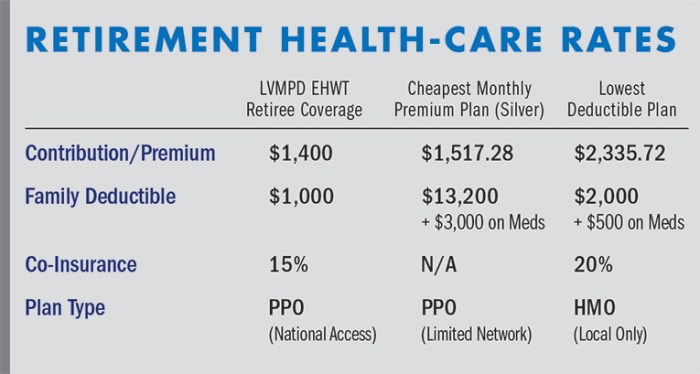
Health care costs in retirement can be a significant concern for many individuals as they transition from full-time work to a new lifestyle. Understanding the financial implications of health care can make a world of difference in ensuring a comfortable retirement.
From rising expenses due to healthcare inflation to the varying costs based on geographic location, retirees need to be well-informed and prepared. By exploring the types of health care expenses one might encounter and the strategies available for managing these costs, individuals can better navigate this crucial aspect of their retirement planning.
Understanding Health Care Costs in Retirement

As individuals approach retirement, one significant aspect to consider is the potential costs associated with health care. These expenses can vary greatly and are influenced by multiple factors. Understanding these components is essential for effective financial planning during retirement.Several main factors contribute to the rising health care costs retirees may face. First, advancements in medical technology often lead to more effective but expensive treatments and procedures.
Additionally, the overall increase in life expectancy means that retirees may require care for a longer duration, further escalating costs. The aging population also places a strain on health care systems, resulting in higher premiums and out-of-pocket expenses for individuals.
Types of Health Care Expenses Retirees Should Prepare For
Retirees need to be well-acquainted with the various health care expenses they may encounter. These can be broadly categorized into several key areas:
- Premiums and Deductibles: Monthly premiums for Medicare or private health insurance, along with deductibles that must be paid before coverage kicks in.
- Prescription Medications: Out-of-pocket costs for medications which can increase significantly as one ages, especially for chronic conditions.
- Long-term Care: Costs associated with assisted living facilities, nursing homes, or in-home care, which can be substantial.
- Routine Medical Expenses: Doctor visits, specialist consultations, and any preventative care services recommended by health professionals.
- Emergency Services: Costs arising from unexpected medical emergencies, which can quickly add up if not adequately planned for.
Understanding and anticipating these costs can significantly enhance financial readiness for retirement.
Geographic Variations in Health Care Costs
Health care costs can vary widely depending on geographic location. Certain areas are known for higher medical expenses due to various factors such as local economy, demographic trends, and the availability of medical services. For example, urban areas typically experience higher costs compared to rural locations, largely due to greater demand for services and higher living costs.
“Health care expenses can differ by as much as 50% based on where retirees choose to live.”
This geographic disparity means that retirees should carefully consider their preferred retirement location and conduct thorough research on local health care providers and costs. Notably, states such as Massachusetts and New York often have higher health care expenses, while states like Arkansas and Mississippi may offer more affordable options. Therefore, making informed decisions about where to retire can significantly influence overall health care expenditures in retirement.
Strategies for Managing Health Care Costs in Retirement
As retirees navigate their golden years, managing health care costs becomes a significant concern. The financial landscape of retirement can be complex, making it crucial to adopt effective strategies that allow for better budgeting and planning for health care expenses. By understanding various approaches to managing these costs, retirees can maintain their quality of life and reduce financial stress.One effective way to manage health care expenses during retirement is through careful budgeting.
Establishing a detailed budget that includes anticipated medical expenses can help retirees allocate their resources wisely. It is essential to account for not just regular premiums, but also out-of-pocket costs such as deductibles, copayments, and prescription medications. Keeping track of these expenses on a monthly basis allows retirees to adjust their budgets as necessary.
Budgeting for Health Care Expenses
To create a comprehensive budget for health care expenses, consider the following key components:
- Estimate Annual Health Care Costs: Analyze past medical expenses to forecast future costs. Include routine check-ups, specialist visits, and emergencies.
- Set Aside an Emergency Fund: Aim to have a separate fund that can cover unexpected medical expenses, ideally three to six months’ worth of expenses.
- Utilize Health Savings Accounts (HSAs): If eligible, HSAs can be a tax-advantaged way to save for future medical costs, as they allow contributions, tax-free growth, and tax-free withdrawals for qualified medical expenses.
Understanding the variety of health care plans available is also crucial when managing costs. Comparing plans can help retirees select the one that best fits their needs. This involves not only looking at premiums but also understanding out-of-pocket maximums and what services are covered.
Comparing Health Care Plans
When evaluating different health care plans, retirees should consider these important factors:
- Premiums and Deductibles: Understand the monthly premiums in relation to the deductible and out-of-pocket costs.
- Network of Providers: Ensure that preferred doctors and hospitals are in-network to avoid additional charges.
- Prescription Drug Coverage: Review the formulary of each plan to check if regular medications are covered and at what cost.
Supplemental insurance plays a vital role in managing out-of-pocket costs that primary health care plans may not cover. This type of insurance can help fill in gaps and provide greater financial security.
The Importance of Supplemental Insurance
Supplemental insurance is designed to complement primary health care coverage, making it an essential resource for retirees. Here’s why it’s important:
- Covering Gaps in Coverage: Plans like Medicare Supplement (Medigap) can help pay for costs such as coinsurance and copayments.
- Preventing Financial Strain: With the rising costs of medical care, supplemental insurance can provide peace of mind and protect savings against unexpected health issues.
- Flexible Options: Many supplemental plans offer various levels of coverage, allowing retirees to choose based on their health care needs and budget.
By implementing these strategies, retirees can effectively manage their health care costs, ensuring they have the financial means to enjoy their retirement years without unnecessary worry about medical expenses.
Investment Options for Covering Future Health Care Costs
Navigating the landscape of health care costs in retirement requires strategic financial planning, particularly when considering the various investment options designed to address these potential expenses. As health care needs often rise with age, it’s vital to adopt a proactive approach in selecting investments that can help cover these costs, ensuring financial stability and peace of mind during retirement years.Investment strategies should focus on generating growth and providing liquidity for health care expenses.
One effective method is to allocate funds into diversified investment vehicles that can yield returns over time. Mutual funds, in particular, are a popular choice for retirees, as they offer a way to pool resources while spreading risk across various sectors.
Role of Mutual Funds in Retirement Portfolios
Mutual funds play a significant role in building a retirement portfolio geared toward managing health care expenses. These funds are managed by professionals who invest in a variety of assets, providing investors with broad exposure and diversification.Investors should consider the following types of mutual funds when planning for health care costs:
- Health Care Sector Funds: These funds specifically invest in companies involved in pharmaceuticals, biotechnology, and medical devices, capitalizing on the growth of the health care industry.
- Balanced Funds: Combining stocks and bonds, balanced funds aim to provide steady growth while minimizing risk, making them suitable for retirees focused on income generation.
- Target Date Funds: These are designed to automatically adjust the asset mix as the target date approaches, allowing retirees to maintain an appropriate risk level as they draw closer to using their retirement savings.
By incorporating these mutual fund options, retirees can create a more resilient portfolio that not only addresses immediate health care costs but also allows for potential growth to keep pace with inflation.
Retirement Planning Approach Incorporating Health Care Expenditures
A comprehensive retirement planning approach needs to factor in expected health care expenditures. This involves not only setting aside funds but also considering diverse investment strategies, including day trading and futures, which can provide additional avenues for growth.Including day trading in a retirement strategy can offer short-term gains; however, it requires significant market knowledge and a higher risk tolerance. Investors may want to allocate a small portion of their portfolio to this method, ensuring the bulk of their investments remain in more stable assets.Futures contracts can also serve as a tool for advanced investors looking to hedge against rising health care costs.
By locking in prices for health care services or medications, retirees can reduce the uncertainty associated with future expenditures. For example, an investor might enter into a futures contract for a specific pharmaceutical stock, anticipating the drug’s demand will rise, thus providing returns that can offset future health care costs.In summary, a well-rounded investment strategy for covering future health care costs in retirement should blend various mutual funds and consider advanced options like day trading and futures, ensuring that retirees are equipped to handle their healthcare financial obligations.
Final Summary

In summary, effectively managing health care costs in retirement is essential for safeguarding financial stability and ensuring quality care. By implementing strategic budgeting, exploring investment options, and understanding various health plans, retirees can confidently approach their health care needs without unnecessary stress.
Questions and Answers
What are the main factors contributing to rising health care costs in retirement?
Key factors include increasing medical technology costs, aging populations, and the rise in chronic health conditions.
How can retirees effectively budget for health care costs?
Retirees can estimate their health care expenses, set aside funds in health savings accounts, and regularly review their spending to adjust their budgets accordingly.
What types of health care expenses should retirees prepare for?
Retirees should prepare for premiums, deductibles, copayments, long-term care, and prescription medications.
Is supplemental insurance necessary for retirees?
Supplemental insurance can be very beneficial in covering out-of-pocket costs that primary insurance may not fully address.
What investment strategies can help cover future health care costs?
Investment strategies may include setting up a diversified portfolio, utilizing mutual funds, and considering health savings accounts that offer tax benefits.






